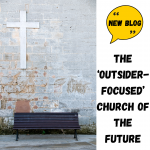Diminishing community spirit in our cities may not be obvious to those of us who are urbanites, but I challenge anyone who have been lucky enough to experience the sociability of a country football club, as I have, to compare it to city sports clubs. Small towns unite in ways that are becoming increasingly rarer in larger conurbations – they help one another through hard times, like a big family. There is a sense of giving support to others, an attitude that our cities have largely lost. ¬¬
Our family households are changing too. Terms like “Sandwich Generation” and “Boomerang Generation” reflect trends in the lives of contemporary families. Grown up children are moving out of the family home as adults much later than previous generations did. Reasons for this? Reoccurring explanations include the difficulty of saving for a house, the rising costs of tertiary education, greater competition for fewer graduate jobs, and the significant escalation in contract based and temporary jobs. Middle-aged parents are finding themselves “sandwiched” between caring for elderly relatives and supporting their children. As a result of economic difficulties and increased breakdowns in relationships, there is an escalation in young adults returning (“boomeranging”) to family homes when their own newly established households become too challenging. The overlapping of multiple generations in contemporary households is occurring far more than we realise.
It makes sense to care for our own family – supporting one another and interacting with all the generations. It’s natural to live in multi-generational family households – up until the latter part of the twentieth century we’d done it for millennia. Living spaces should mould ¬with the changeable dynamics of today’s family households, and modern homes should allow for a blend of independent and communal areas for all generations to thrive. Arcuate is exploring design ideas that look to reduce the overall footprint of how we live, that moderate economic pressures, encourage social cohesion, and offer collective support. The young helping elderly relatives, the oldies supporting the youngsters. ¬We need to look after each other better and it seems only natural to start with the family.
Arcuate is always exploring sustainable and innovative designs that enrich the quality of life of individuals and communities. We contribute to Australia’s social and environmental rejuvenation by using research and conversation as a base to establish new directions in thinking. Launched through a new focal sector of Arcuate, Arcuate Abode, this is the first blog in the beginning of a dialogue about the quality of the places where we live.





